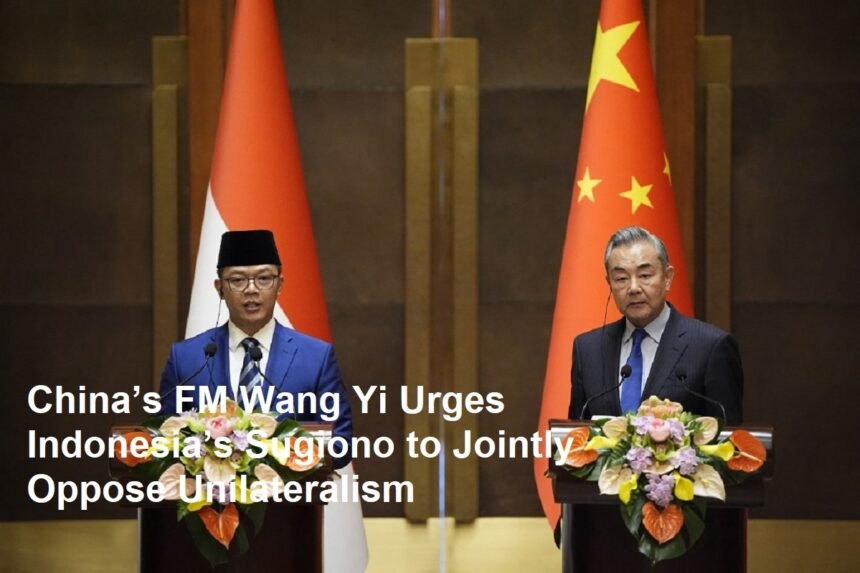On Monday, April 21, 2025, at a joint press conference following the inaugural “2+2” ministerial dialogue in Beijing, China’s Foreign Minister Wang Yi called on his Indonesian counterpart, Sugiono, to unite against “any form” of unilateralism and trade protectionism. The event, which brought together both countries’ foreign and defense ministers, underscored a shared commitment to multilateralism amid rising global trade tensions.
The “2+2” dialogue—co-chaired by Wang Yi alongside Defence Minister Dong Jun, and by Indonesia’s Foreign Minister Sugiono together with Defense Minister Sjafrie Sjamsoeddin—marked the first high-level meeting of its kind between the two neighbours. Held under the strategic guidance of Presidents Xi Jinping and Prabowo Subianto, ministers reviewed progress on the five-pillar cooperation framework, which encompasses political, economic, people-to-people, maritime, and, newly added, security dimensions. A joint communiqué highlighted the launch of a “Comprehensive Strategic Dialogue Mechanism” to bolster ongoing collaboration.
At the podium, Wang Yi emphasized that “the world is undergoing transformations unseen in a century,” warning that hegemonic practices and unilateral acts threaten global stability. “We should oppose any form of unilateralism and protectionism and believe that the abuse of tariffs will severely undermine normal economic and trade exchanges between countries,” he declared, stressing that China and Indonesia—as major representatives of the Global South—must send a signal of unity to the world.
Indonesia’s Foreign Minister Sugiono affirmed his country’s alignment with this vision. He noted that “Indonesia has always regarded China as one of its most important partners,” and underlined Jakarta’s determination to deepen bilateral ties while upholding a rules-based international order. Sugiono reiterated Indonesia’s commitment to “comprehensively deepening relations with China” on the occasion of the 75th anniversary of diplomatic relations, and pledged to work in concert to defend multilateral trading systems and international justice.
Trade cooperation featured prominently in the discussions. Wang Yi announced China’s intention to increase imports of Indonesian products, citing the strong complementarity between the two economies. He linked this pledge to China’s broader support for economic globalization and free trade, signaling opportunities for Indonesian exporters of agricultural commodities, minerals, and manufactured goods. Sugiono, whose recent Washington visit aimed to secure more U.S. market access, welcomed the Shanghai declaration as a vital counterbalance to protectionist pressures globally.
Beyond economics, the ministers agreed to enhance maritime security cooperation, particularly in the South China Sea. A memorandum of understanding between the two coast guards was signed to facilitate joint patrols, search-and-rescue exercises, and the sharing of intelligence on transnational crimes. Both sides pledged to fully implement the Declaration on the Conduct of Parties in the South China Sea and to accelerate consultations on a binding Code of Conduct, aiming to defuse tensions around Indonesia’s Natuna Islands and foster safe, unimpeded sea lanes.
Analysts view Wang’s appeal as part of a broader strategy by Beijing to rally ASEAN and Global South nations against unilateral measures wielded by major powers. “By aligning with Indonesia—a leading Southeast Asian democracy—China demonstrates that its vision of multipolar cooperation transcends ideology,” said Dr. Michael Tan of the Asia Policy Institute. However, some ASEAN observers caution that Jakarta must balance its China engagement with security ties to other partners, including the United States and India.
Looking ahead, both foreign ministries will convene working groups under the new Comprehensive Strategic Dialogue Mechanism to coordinate on issues ranging from supply-chain resilience to cyber security. The next round of meetings is slated for Jakarta in July, on the sidelines of the ASEAN Foreign Ministers’ Retreat. As global fragmentation deepens, China and Indonesia aim to showcase their partnership as a model of equitable, rules-based cooperation—rooted in the Bandung Spirit and the Five Principles of Peaceful Coexistence.









